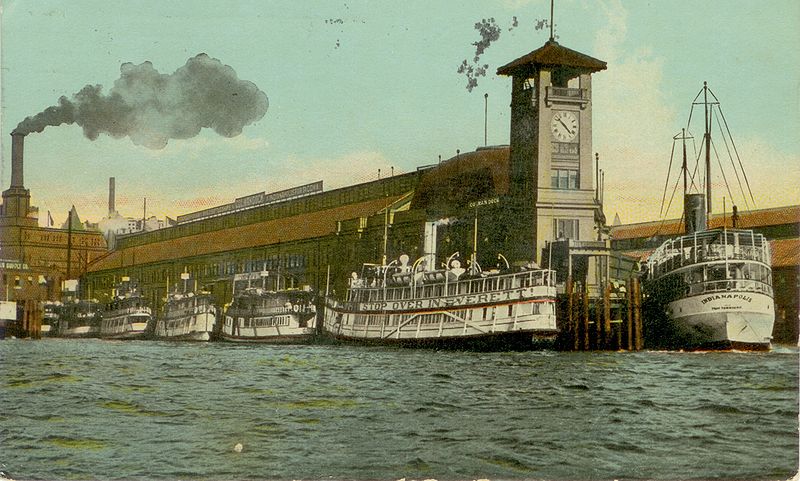Because I had the luck of having been raised on the Seattle shores of Lake Washington, I recall the last runs of the Madison-Kirkland and the Leschi ferries. Several of our waterfront parks, especially Madison Park, Madrona Park, and Leschi Park emerge from that era.
I remember taverns and restaurants replacing those abandoned sites. I have visited friends at apartments and condominiums overlooking water-logged, lonely pilings and street-ends, lingering evidence of a once-busy commotion of travelers. The rich history of Seattle would have been a relatively modest story without these watery links to the second-largest lake in Washington State. With Seattle’s burgeoning population and a simultaneous rise in the popularity of bicycles, motor bikes, and other strange modes of city street travel, some are asking if the old Mosquito Fleet of small boats might be revived.
Do the local names Brewster, Brighten Beach, Calverts, Barnaby, or Belt Line mean anything to Seattle-area residents today? Those tiny lakeside stations were among the 50-plus stops the old Lake Washington steamboats – or Mosquito Fleet – made in the early 1900s. Although the term “Mosquito Fleet” is correctly attached to Puget Sound routes (and occasionally coastal waters), it can also be used in connection with Lake Washington water transport.
Captain Adolph J. Anderson, with his brother Captain John L. Anderson, operated much of the Puget Sound and Lake Washington steamboat trade at the turn of the 20th century. On the lake, Anderson Steamboat Company boats ran north to Juanita and south to Rainier Beach, with dozens of intermediate stops – some of them for the convenience of a friend or a waving hand on the end of a dock. There were occasional accidents and miscalculations by passengers and freight-handlers, resulting in a frightened passenger struggling in the water below the passenger ramp or a load of building material or groceries sinking to the muddy bottom.
Mercer Island was then a farming wilderness and a true island, sometimes called East Seattle. The Anderson boats put in at five locations on the Island’s west shore, and at eight ports-of-call along the eastern shore. Clusters of homes, schools, small businesses, and country roads emerged at the Mosquito Fleet coves and wharves.
On the Seattle or western shore, the 1909 Alaska-Yukon-Pacific Exposition site (now the University of Washington) was a principal water landing. Other Seattle ferry stops remain: Madison Park, Leschi Park, Mt. Baker Park, Brighten Beach, and Rainier Beach. Cross-lake, along the once remote shores of the eastern edge, today’s names match the original stops: Juanita, Yarrow, Kirkland, Medina, and Newport. Other more-or-less forgotten ports were Cedarmere, Churches, Demotts, Curtis, Northrup, Sunnyside, Lewisville, Hazelwood, and Kennydale.
The Anderson boats were constructed and managed for foot passengers and freight. After 1901, the occasional internal-combustion car was brought aboard, pushed and later rolled off the other end. I was told by a Seattle neighbor that an elder member of her family driving a Ford Model T attempted to come aboard after the drawbridge had been raised, resulting in a large splash, some panic, and the driver’s death by drowning.
Mosquito Fleet boats lost business with the construction of roads around Lake Washington. For example, Peter Kirk’s establishment of Kirkland and C.P. Hillman’s platting Kennydale near the coalmines of Newcastle and Black Diamond were better served by wheeled land transportation. With newcomers streaming across the new Mercer Island floating bridge, and real estate booms underway in the Bellevue area, the pokey but charming Mosquito Fleet lost business. Captain Anderson was forced to close out one of the pleasant and exciting chapters in Puget Sound history.
I wonder: Is it time to revive our Mosquito Fleet and return casual visitors, commuters, and residents to scenic routes serving the many bays, rivers, parks, and small junctions of Lake Washington and Puget Sound?
Discover more from Post Alley
Subscribe to get the latest posts sent to your email.

The proposals to revive a commuter ferry from Kirkland to South Lake Union usually founder over the reduced speed limit of passing through the Montlake Cut. But now that there is a light rail station near Husky Stadium, I wonder if a Kirkland-Husky Stadium route makes more sense. As always with these proposals, the killer is the need for parking lots.
Thanks for this wonderful slice of our transportation history. I made this documentary about the history of Mercer Island in 2004 that prominently features the steamer “Dawn” and the memories of commuters who rode it to Leschi. https://youtu.be/YMOBxM8H9_o
Our historic Roanoke Inn is a vestige of those ferries, and we still call a neighborhood East Seattle!
Thanks, Junius. Enjoyed hearing about my new home town. Your friend, Bill Dunn